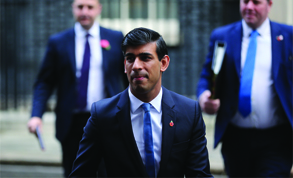News / Government accepts recommendations for public sector pay increase
The recommendations include a 6% increase for doctors and dentists, as well as an additional £1,250 consolidated payment for junior doctors in 2023/24. The majority of NHS staff are not affected by this offer, as they are employed under the agenda for change framework, which was covered in a separate settlement earlier this year.
Mr Sunak (pictured) said that he has accepted all elements of the pay review bodies recommendations: ‘I can confirm that today we’re accepting the headline recommendations of the pay review bodies in full.’ He emphasized, however, that this does not mean more government funding: ‘We only have a fixed pot of money to spend from. That means government departments have to find savings and efficiencies elsewhere.’
The announcement comes just as junior doctors in England begin a historic 5-day strike after rejecting the government’s previous offer of a 5% pay increase. Mr Sunak added that the government does not intend to negotiate further: ‘Today’s offer is final. There will be no more talks on pay. We will not negotiate on this year’s settlements. And no amount of strikes will change our decision.’
Phil Banfield, chair of council for the BMA, says that the offer still wasn’t enough: ‘Today’s announcement represents yet another pay cut in real terms and serves only to increase the losses faced by doctors after more than a decade’s worth of sub-inflation pay rewards.’ He added: ‘The BMA will continue to fight for the full restoration of pay lost since 2008 and reform of the pay review bodies; that includes the further losses delivered through this announcement.’
Saffron Cordery, deputy chief executive of NHS Providers, raised concerns about how the increase will be funded: ‘Government funding is currently available to cover 3.5 % pay rises for NHS doctors and dentists. Pay awards above this would require cash, which may have to be found by raiding existing NHS budgets.’ She expressed particular worry about how this will impact other struggling services: ‘If that kind of money has to be found instead from the Department of Health and Social Care’s budget, already overstretched social care services as well as vital prevention and public health services could be affected too.’
Matthew Taylor, chief executive of the NHS Confederation, also raised concerns about the government’s backing for the NHS: ‘The government cannot say that it is committed to cutting waiting lists and supporting the NHS’s workforce and then not give the NHS the investment is needs to support the new pay award.’
The government also accepted recommendations from the Senior Salaries Review Body for a 5% uplift for very senior managers in the NHS and executive senior managers. An additional 0.5% of the managerial pay bill in each organisation will also be used to address pay anomalies. However in a statement to the House of Commons, health secretary Steve Barclay rejected calls for central approval of proposed senior manager pay to be provided within four weeks. ‘I agree that improvements should be made to the process, but cannot accept this recommendation in full as the department will need sufficient time to review and scrutinise any bid we receive,’ he said.
In terms of funding the pay deals, Mr Barclay said there would be increases to the immigration health surcharge. Beyond this, he said the deals would be funded ‘through prioritisation within existing departmental budgets’ with protection given to frontline services.
Related content
The HFMA mental health conference is a learning and development event and is the largest face to face event for the HFMA Hub mental health network.
HFMA London Branch, SDN and London Finance Academy look forward to welcoming you to the Annual conference 2024